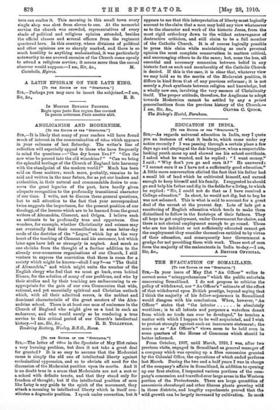[TO TER EDITOR 07 TER "SPECTATOR."] SIR, — The letter of 03 , rts
in the Spectator of May 21st raises a very burning problem, but does it not take a great deal for granted ? It is so easy to assume that the Modernist cause is simply the old one of intellectual liberty against ecclesiastical oppression, and so to obviate all need for the discussion of the Modernist position upon its merits. And it is no doubt true in a sense that Modernists are not a sect or a school with definite tenets, and that they stand only for freedom of thought ; but if the intellectual position of men like Loisy is any guide to the spirit of the movement, they attach a meaning to intellectual liberty which in itself con- stitutes a dogmatic position. I speak under correction, but it appears to me that this interpretation of liberty must logically amount to the claim that a man may hold any view whatsoever as to the character and work of the historic Jesus, from the most rigid orthodoxy down to the wildest extravagance of destructive criticism, and still claim to be a full member of the Catholic Church. It is of course logically possible to press this claim while maintaining as one's personal opinion the most complete conservatism in matters critical, and encouraging others to do the same; but, none the less, all essential and necessary connexion between belief in any historic fact as such and membership of the Catholic Church is denied. If this is the case, it is clear that, whatever view we may hold as to the merits of the Modernist position, it differs in kind from that of any previous reformer ; it is not merely a fresh synthesis between religion and knowledge, but a wholly new one, involving the very essence of Christianity itself. The proper attitude, therefore, for Anglicans to adopt towards Modernism cannot be settled by any a priori generalisations from the previous history of the Church.a..
I am, Sir, Aro., OLIVES C. QuIcir. The Bishop's Hostel, Farnham.














































 Previous page
Previous page